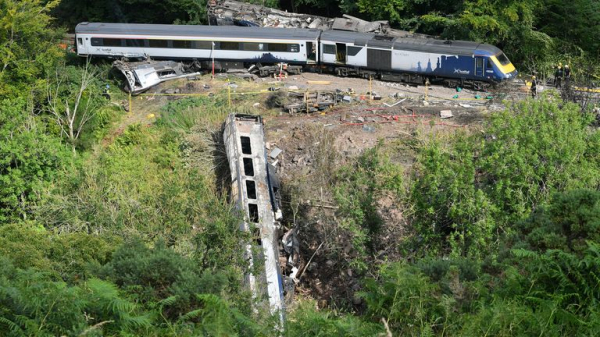Network Rail pleads guilty over its involvement in train crash in Scotland which left three dead

Network Rail has pleaded guilty to health and safety failings over a train crash which claimed three lives.
Train driver Brett McCullough, 45, conductor Donald Dinnie, 58, and passenger Christopher Stuchbury, 62, died when the train derailed at Carmont, near Stonehaven in northeast Scotland, on 12 August 2020.
The morning ScotRail service from Aberdeen to Glasgow Queen Street derailed after it hit a landslide following heavy rain.
The train hit the side of a bridge, causing its power car and one of its four carriages to fall down an embankment.
Of the nine people on board the 6.38am service, three were killed and six were injured after the train hit gravel and other debris that had washed onto the track.
The crash happened shortly before 9.40am when the train was on its way back to Aberdeen due to the railway being blocked further down the line.
A Rail Accident Investigation Branch (RAIB) report published last March found errors in the construction of a drainage system installed by Carillion meant it was unable to cope with heavy rain which fell in the area on the morning of the crash.
Carillion went into compulsory liquidation in January 2018.
The RAIB report made 20 recommendations to improve railway safety, many of which were directed at Network Rail.
At the High Court in Aberdeen on Thursday, Network Rail admitted a charge covering the period from May 1, 2011 to August 12, 2020.
It admitted it failed to ensure, so far as was reasonably practical, that railway workers not in its employment and members of the public travelling by train were not exposed to the “risk of serious injury and death from train derailment” as a result of failures in the construction, inspection and maintenance of drainage assets and in adverse and extreme weather planning.
The charge states that in particular, the company failed to ensure, so far as was reasonably practicable, that a drainage asset located off-track of the Dundee to Aberdeen railway line near Stonehaven, constructed by Carillion between May 1, 2011 and December 31, 2012, was “constructed properly” and in accordance with the design drawings.
The charge also says Network Rail failed to conduct a handover meeting with the contractors to check the drainage asset had been properly constructed and built in accordance with the design.
The firm also admitted it did not have an adequate system of training and quality assurance in place in relation to the analysis of weather forecasts, which resulted in no emergency extreme weather action teleconference being held on the morning of the crash.
Court documents said there was a forecast of “extreme rainfall” and reports of severe weather, landslips and flooding in Aberdeenshire and the surrounding area on the day of the crash.
The charge states Network Rail failed to impose an emergency speed restriction “in absence of current information about the integrity of the railway line and drainage assets between Montrose and Stonehaven”, and failed to inform the driver that it was unsafe to drive the train at a speed of 75mph or caution him to reduce his speed.
The charge outlined how the drainage asset which had not been properly constructed failed, gravel was washed out from the drainage trench and on to the railway track, which the train struck, causing it to derail, decouple and strike a bridge parapet.
Network Rail admitted breaching two sections of the Health and Safety at Work etc Act 1974.
The company has said that since August 2020, it has been working hard to make the railway safer and has made significant changes to how it manages the risk of severe weather to the network.
The prosecution came after the Crown Office and Procurator Fiscal Service (COPFS) considered reports from a joint investigation by Police Scotland, British Transport Police and the Office of Rail and Road – the independent safety and economic regulator for the country’s railways.
